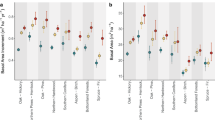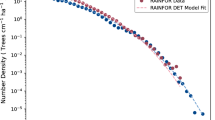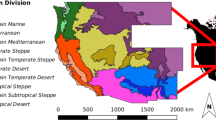Abstract
THE vegetation on a tract changes as a field or felled forest becomes a forest again, and a quantitative statement of the changes is needed for comparing one period of changes with another and for logical extrapolation to the equilibrium or steady state. Enumeration of the stems in four mixed hardwood forests during 40 yr has enabled us to test “transition probabilities” as a means of stating, analysing and making use of the observed changes.
This is a preview of subscription content, access via your institution
Access options
Subscribe to this journal
Receive 51 print issues and online access
$199.00 per year
only $3.90 per issue
Buy this article
- Purchase on Springer Link
- Instant access to full article PDF
Prices may be subject to local taxes which are calculated during checkout
Similar content being viewed by others
References
Feller, W., An Introduction to Probability Theory and its Application, 1 (Wiley, New York, 1957).
Hicock, H. W., Morgan, M. F., Lutz, H. J., Bull, H., and Lunt, H. A., Conn. Agric. Exp. Sta. Bull., 330 (1931).
Olson, A. R., Conn. Agric. Sta. Bull., 669 (1965).
Stephens, G. R., and Waggoner, P. E., Conn. Agric. Sta. Bull., 707 (in the press).
Author information
Authors and Affiliations
Rights and permissions
About this article
Cite this article
WAGGONER, P., STEPHENS, G. Transition Probabilities for a Forest. Nature 225, 1160–1161 (1970). https://doi.org/10.1038/2251160a0
Received:
Issue Date:
DOI: https://doi.org/10.1038/2251160a0
This article is cited by
-
Predicting community structure of ground-foraging ant assemblages with Markov models of behavioral dominance
Oecologia (2011)
-
Distance decay of community dynamics in rocky intertidal sessile assemblages evaluated by transition matrix models
Population Ecology (2010)
-
Predicting decay and ground vegetation development in Picea abies snag stands
Plant Ecology (2005)
-
Effects of fire frequency on plant communities and landscape pattern in the Massif des Aspres (southern France)
Landscape Ecology (1996)
-
Changes of plant cover and land use types (1950's to 1980's) in three mire reserves and their neighbourhood in Estonia
Landscape Ecology (1993)
Comments
By submitting a comment you agree to abide by our Terms and Community Guidelines. If you find something abusive or that does not comply with our terms or guidelines please flag it as inappropriate.



